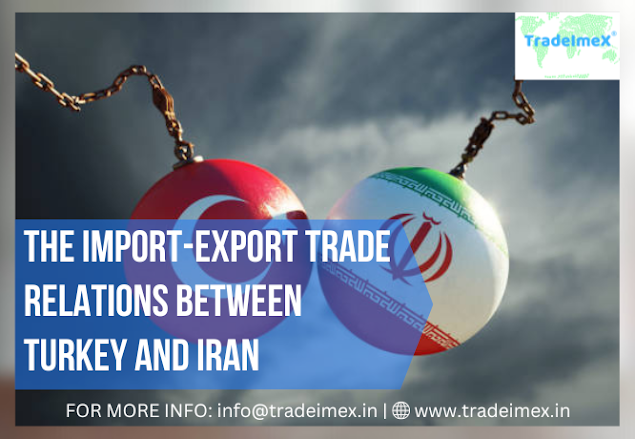STRENGTHENING BONDS: THE IMPORT-EXPORT TRADE RELATIONS BETWEEN TURKEY AND IRAN
INTRODUCTION
Trade relations have always played a
crucial role in fostering diplomatic ties and promoting economic growth between
nations. One such noteworthy partnership exists between Turkey and Iran.
Situated at the crossroads of Europe and Asia, these neighboring countries have
a long history of trade interactions, sharing cultural ties, and a strategic
location. This blog is all about import-export trade relations between Turkey
and Iran and delving into the factors that have shaped their enduring economic
partnership over these past few years.
HISTORICAL CONTEXT
Turkey and Iran's trade relations
date back centuries, with the Silk Road acting as a vital conduit for commerce
between the regions. The geographical proximity and shared borders have
contributed to a natural trade flow over time. Moreover, cultural and
historical affinities have further strengthened the commercial ties between the
two nations.
TRADE VOLUME AND BALANCE
In recent years, the bilateral trade
volume between Turkey and Iran has been substantial. According to the latest
available data, the trade volume in 2021 reached approximately $12 billion,
reflecting the significance of their economic partnership. However, it is worth
noting that the trade balance has generally been in favor of Turkey, with a
higher export value compared to imports from Iran. Based on Turkey Trade Data
report for previous years:
|
BILATERAL
TRADE BETWEEN TURKEY AND IRAN |
|||
|
YEAR |
IMPORT FROM
IRAN |
EXPORT TO
IRAN |
TOTAL TRADE |
|
2018 |
USD 6.90 billion |
USD 2.39 billion |
USD |
|
2019 |
USD 3.60 billion |
USD 2.73 billion |
USD |
|
2020 |
USD 1.19 billion |
USD 2.25 billion |
USD |
|
2021 |
USD 2.82 billion |
USD 2.77 billion |
USD |
|
2022 |
USD 3.35 billion |
USD 3.06 billion |
USD |
EXPORT COMMODITIES
Turkey's exports, as per Turkey Export Data report
to Iran consist of various goods, including machinery, industrial products,
textiles, vehicles, chemicals, and construction materials. Turkish
manufacturers have found a receptive market in Iran, which has spurred their
export growth. Notably, Turkey's automotive sector has emerged as a key player,
with Iranian consumers showing a preference for Turkish-made vehicles.
IMPORT COMMODITIES
Iran, on the other hand, exports a
wide range of commodities to Turkey. As per Turkey Import Data
statistics, the major imports of Turkey from Iran are energy resources,
particularly oil and natural gas, which have traditionally constituted a significant
portion of Iran's exports to its neighboring country. Other notable imports
from Iran include agricultural products, minerals, petrochemicals, and raw
materials for various industries. These imports help meet Turkey's domestic
demands while diversifying its sources of supply.
CHALLENGES AND OPPORTUNITIES
Despite the overall positive
trajectory of their trade relations, Turkey and Iran have faced certain
challenges. Sanctions and geopolitical tensions have occasionally disrupted the
smooth flow of trade. However, both countries have shown resilience and
adaptability in navigating these obstacles. Efforts to enhance cooperation through
bilateral agreements and joint initiatives have helped mitigate such challenges
and create new opportunities for trade expansion.
TRANSPORTATION AND INFRASTRUCTURE
Improving transportation links has
been a focus area for Turkey and Iran, as it plays a crucial role in
facilitating trade. The completion of various road and rail projects has
strengthened connectivity between the two countries. The ongoing development of
the Iran-Turkey gas pipeline, which aims to increase energy cooperation, is
another significant step toward deepening their economic ties.
FUTURE PROSPECTS
The future looks promising for the
import-export trade relations between Turkey and Iran. Both countries possess
diverse economies with complementary sectors, providing a solid foundation for
further collaboration. Opportunities for joint ventures, investment, and
technological exchange hold the potential for mutual benefits and economic
growth. Additionally, the normalization of diplomatic relations and the lifting
of certain sanctions can further catalyze trade between the two nations.
As per Turkey Trade Data report
for the year 2023 for the first five months, the countries registered bilateral
trade worth USD 2.19 billion.
CONCLUSION
The import-export trade relations
between Turkey and Iran have evolved significantly over time, driven by their
historical, cultural, and geographical proximity. Despite occasional
challenges, both countries have maintained a substantial trade volume, with
various commodities flowing in both directions. As they continue to strengthen
transportation links, expand cooperation, and explore new avenues for trade,
Turkey and Iran are poised to foster a prosperous economic partnership that can
bring mutual benefits and contribute to the stability of the region.
For more information and insights
about Turkey and Iran's bilateral trade, get in touch with TradeImeX today.




Comments
Post a Comment